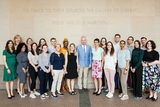Skraban-Deardorff Syndrome Clinic

Learning your child may have a rare genetic disorder that has no known cure can be overwhelming. The Skraban-Deardorff Clinic can help.
Our clinic is led by Cara M. Skraban, MD, one of the doctors who identified the syndrome and its link to the WDR26 gene. We provide expert diagnosis, supportive treatment and ongoing therapy for Skraban-Deardorff syndrome patients and their families.
Children with Skraban-Deardorff syndrome often experience developmental delays, intellectual disabilities, seizures, neurological differences and subtle facial differences.
To meet each patient’s unique needs, our team coordinates with other CHOP specialists to provide individualized recommendations for therapy and treatment.
Our clinic is open to any pediatric or adult patient who has been diagnosed with or has a concerning change in the WDR26 gene.
How we serve you
Our team makes recommendations for your child’s ongoing therapy and treatment needs based on their medical history, test results, symptoms and health issues.
Conditions we treat
Our program treats individuals diagnosed with Skraban-Deardorff syndrome or who have a concerning change in the WDR26 gene identified through genetic testing.

Why choose us for Skraban-Deardorff syndrome care
We provide comprehensive clinical assessment, diagnostic testing and personalized, supportive care for patients with Skraban-Deardorff syndrome.

Meet your team
Every person on your child's team has the same goal: to give your child the best possible care. Our team is led by a genetics expert who helped first identify Skraban-Deardorff syndrome.

Our research
Physicians and researchers at CHOP are actively studying Skraban-Deardorff syndrome with the goal of improving patients' quality of life and addressing symptoms that may cause discomfort. We can connect your family with active clinical studies.
Your donation changes lives
Donations fuel breakthrough discoveries, innovative care and pioneering treatments in the Division of Human Genetics.
